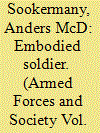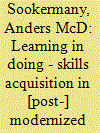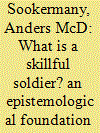| Srl | Item |
| 1 |
ID:
106439


|
|
|
|
|
| Publication |
2011.
|
| Summary/Abstract |
The transformation of the Armed Forces is changing our understanding of what good soldiering skills are. The ongoing (post) modernization process aims to develop military communities of practice that are ready, willing, and able to serve and fight anyone, anywhere, and anytime on a regular basis. As a consequence, many Western countries such as Norway are witnessing a radical shift from an invasion defense-based concept grounded on conscription toward a more flexible expeditionary force-based defense concept that emphasizes professionalism. As such, it follows the typology of a change from a modern to a postmodern military. The understanding of the soldier as a human body is of great interest in this context since it is the individual (the soldier) who is to bring this transformation to life through his or her military (bodily) actions/skills within the military community of practice of which he or she is a member. This study describes and interprets the consequences of the ongoing military transformation with regard to the view of the human body so as to better understand the epistemological foundation for good soldiering skills.
|
|
|
|
|
|
|
|
|
|
|
|
|
|
|
|
| 2 |
ID:
110079


|
|
|
|
|
| Publication |
2011.
|
| Summary/Abstract |
One of the strategic aims of the modernisation of NATO is to develop military forces that can be deployed to conflict areas where and when the need arises, and that have capabilities that are as well-adapted to the situation as possible. What consequences will this have for how we think about skills acquisition in the professional military communities of practice of the future? The intention of this article is to seek understanding concerning precisely this: how situation-dependent skills can be acquired. In examining this issue, I draw attention to new learning-related concepts and insights that may provide solutions to the complex situational challenges that [post]modern military operations present to soldiers and their communities of practice in relation to skill utilisation and skills acquisition. I therefore seek to link the ongoing military transformation with the growing debate about practice-centred learning generally, and apprenticeship-like forms of learning, such as situated learning, in particular.
|
|
|
|
|
|
|
|
|
|
|
|
|
|
|
|
| 3 |
ID:
115265


|
|
|
|
|
| Publication |
2012.
|
| Summary/Abstract |
How do we understand military skill/skills, what is it to be militarily skilled, and how do we acquire military skill/skills? Answering these three questions is essential to understanding the ongoing military transformation of developed Western countries. Universalism and contextualism (two competing ethical/epistemological positions) are used to sketch out a typological framework for explaining how different military paradigms/concepts treat "good" soldiering. Universalism is strongly connected with the traditional military paradigm of static invasion-based defense, while contextualism is connected to flexible expeditionary force-based defenses of the twenty-first century. Transformative changes over the past decade illustrate the value of the contextualist paradigm, suggesting that the universalist paradigm may no longer be useful for a twenty-first century expeditionary force.
|
|
|
|
|
|
|
|
|
|
|
|
|
|
|
|